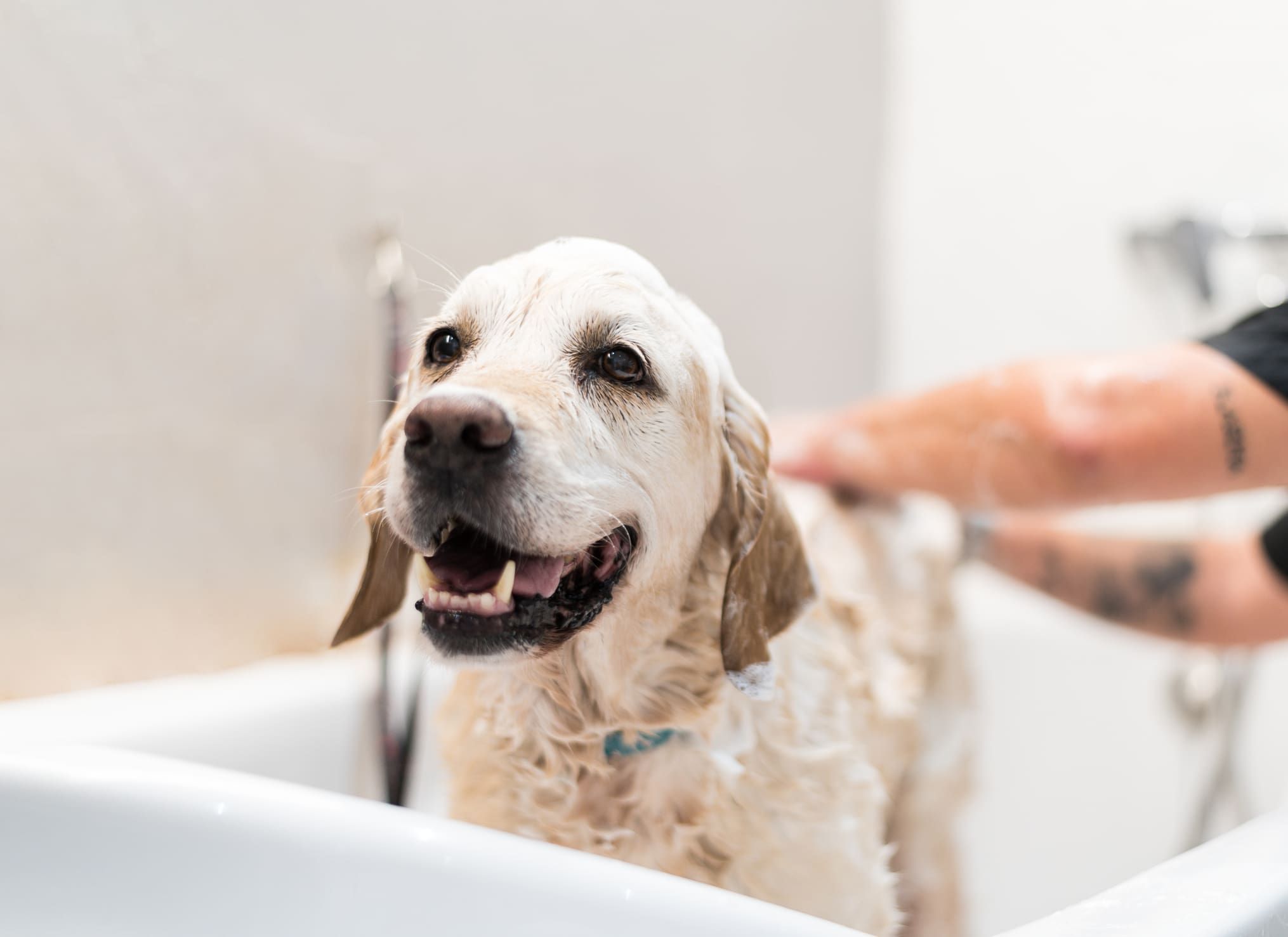For a normal dog who doesn’t have atopic dermatitis or any other skin irritation, you can use human hair shampoo to bathe your dog. And, as the TV ads like to remind us, Dawn Dish Soap is safe and cleans animal coats (and feathers!) quite well. Frankly, for many of us, dish soap is what we reach for first when our dog adds a layer of mud to his coat. Baby shampoo, since it is specifically made to be gentle and not irritate the tender skin on human babies, is a good choice for your dog, too.
Overall, your choice of shampoo depends upon your dog (and your wallet, of course). We would be extra cautious with dogs with sensitive skin or any immune disorder, but if your dog is just fine, your choice of a shampoo probably isn’t critical.
It may take some experimentation, though, and many dogs do best with a shampoo treatment best suited to their individual coat. “My go-to for bath time is Dawn first, followed by diluted Bio-Groom Wiry Coat,” says WDJ Executive Editor Kate O’Connor, who owns and competes Airedales. “Airedales can get greasy. They are nice and water-resistant but hard to get really clean without pulling out the dish soap. Dawn followed by the Bio-Groom leaves them clean with a nice crispy coat.”
If you are bathing your dog frequently because he’s a show dog (or a Pigpen!), look for a mild dog shampoo that gets the job done and minimizes the risk of drying out the skin or hair. In other words, for most dogs, we recommend choosing a gentle, moisturizing dog shampoo that gets the job done. Our favorites? The Original Buddy Wash and Burts Bees for Dogs Oatmeal Shampoo.
When to Bathe a Dog
While there are times when the dog is simply filthy—whether from swimming in a lake, rolling in mud, or coming in with leprechaun-like green legs from romping through fresh grass clippings—in general dogs don’t need many baths. (They do, however, need regular grooming at home, whether long-haired, short-haired, or wire-haired).
“For normal dogs, the biggest issue probably isn’t the shampoo itself but how often the bath is given and what the whole bathing protocol involves,” says William H. Miller Jr., VMD, DACVD, Professor Emeritus of Dermatology at Cornell University’s College of Veterinary Medicine. “Many people over-bathe their dogs, as far as skin health is concerned. You can cause some skin issues if you bathe your dog too often, even with a very mild shampoo.”
Also, while most groomers will tell you that a dog must be completely dried after a bath prevent aggravating fungal skin conditions (especially if the dog has an extremely heavy coat), Dr. Miller contends that “intense blow drying after the bath can only make things worse.”
Selecting a Dog Shampoo
Whole Dog Journal is reader-supported. If you purchase through links on our site we may earn a commission. Whole Dog Journal does not accept money for its food and product reviews.
By and large, we will choose to use dog shampoos when we can. It’s true that dogs and humans have slightly different pH levels of their skin and hair, but the numbers aren’t all that different (nor completely agreed upon). Some groomers aren’t buying the widely held belief that you must choose a shampoo that has the same pH as the hair coat—few companies even list the product pH on the label.
Here’s what we think about bathing your dog:
- If your dog is smelly and dirty, bathe him. If you have dog shampoo on hand, great. If you don’t, baby shampoo, your shampoo, or Dawn Dish Soap will work. Rinse well. Towel dry unless you must use a blow dryer.
- When choosing a commercial dog shampoo, look for one that includes the least number of ingredients (read the label). We avoid perfumes, dyes, and fragrances.
- We skip adding a follow-up coat conditioner, unless there’s a reason for it, like a long-coated dog who constantly tangles or a wire-haired terrier. (A shampoo with an added conditioner, like our favorites above, is fine.)
- If a dog has particularly dry skin or may be hypersensitive, you may wish to sacrifice suds to avoid sulfates (including sodium lauryl sulfate, TEA lauryl sulfate, triethanalomine, and alkyl sodium sulfate) on the ingredients list, as these can irritate dry skin. (Sulfates make suds.) Don’t confuse sodium lauryl sulfate with the mild detergent sodium laureth sulfate, which is widely used as a water softener and in baby and other non-irritating shampoos as a cleansing ingredient.
- We wouldn’t bother using a dry shampoo for dogs, unless there is no other choice and you simply need to get some stink out of his coat. Otherwise, give him a wet bath and get him really clean.
- If possible, bathe a puppy with a shampoo for puppies.
Make Your Own Dog Shampoo
You can make your own dog shampoo, if you are so inclined, and we have homemade shampoo recipes for dogs to help you get started. Got fleas? Homemade flea shampoo will help get a start on removing some of those parasites from your dog’s skin (but it is far from the only thing you need to do if you detect fleas!).
Caption: Whether you choose to use Dawn Dish Soap or a commercial dog shampoo to bathe your dog isn’t as important as ensuring your dog has a positive experience getting the bath.

